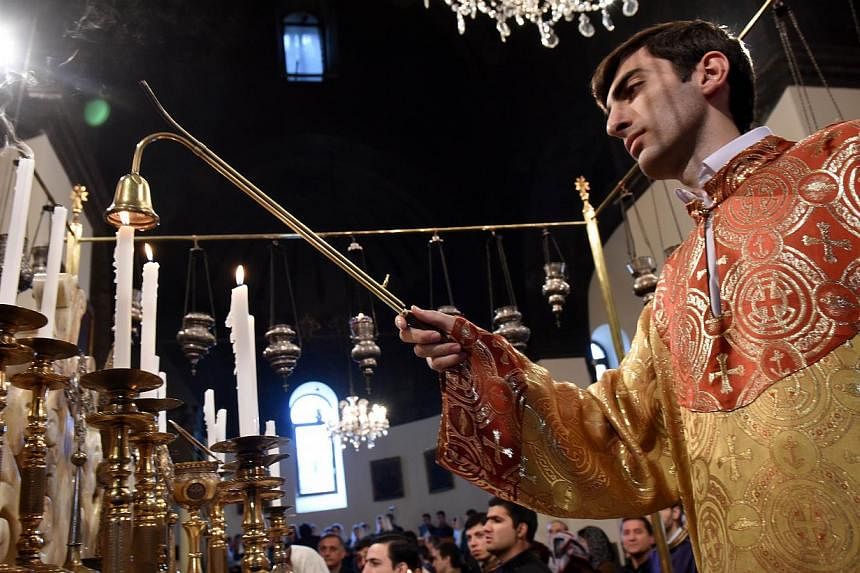ECHMIADZIN, Armenia (AFP) - The Armenian Church began Thursday a ceremony making saints of up to 1.5 million Armenians massacred by Ottoman forces as tensions over Turkey's refusal to recognise the killings as genocide reached boiling point.
The ceremony, which is believed to become the biggest canonisation service in history, came ahead of commemorations expected to see millions of people including heads of state on Friday mark 100 years since the start of the killings.
The service was being held in Armenia's main church, Echmiadzin, an austere fourth-century edifice said to be the Christian world's oldest cathedral, an AFP correspondent reported.
The ceremony outside the Armenian capital Yerevan was set to end at 7:15 pm (11:15pm Singapore time) to symbolise the year when the massacres started during World War I.
"Today's canonisation unites all Armenians living around the globe," Huri Avetikian, an ethnic Armenian librarian from Lebanon who arrived in her ancestral homeland to attend the service, told AFP.
"Souls of the victims of the genocide will finally find eternal repose today," said 68-years-old social worker Varduhi Shanakian. "Supreme justice will triumph," he said ahead of the ceremony.
After the ceremony led by Catholicos of All Armenians, Karekin II, bells will chime in Armenian churches across the world and a minute of silence will be observed.
- 'Collective martyrdom' -
In canonising the victims, "the Church only recognises what happened: that is, the genocide", Karekin II said ahead of the event which Christian Today, an online publication covering religious news, said could become "the biggest saint-making service in history".
"The Armenian Church will proclaim the collective martyrdom of those who were killed over their faith and their homeland," church spokesman Father Ter Vahran told AFP.
Ex-Soviet Armenia and the huge Armenian diaspora worldwide have battled for decades to get the World War I massacres at the hands of the Ottoman forces between 1915 and 1917 recognised as a targeted genocide.
But modern Turkey - the successor to the Ottoman Empire - has refused to do so, and relations remain frozen to this day.
Ankara says 300,000 to 500,000 Armenians and at least as many Turks died in civil - rather than religious - strife when Armenians rose up against their Ottoman rulers and sided with invading Russian troops.
In a rare interview with Turkish television broadcast Thursday, Armenian President Serzh Sarkisian expressed hope that the two countries could mend fences.
"It is obvious that a reconciliation between the two peoples will have to come about through Turkey recognising the genocide," he told CNN-Turk.
On Friday, hundreds of thousands are expected to join a procession to a hilltop memorial in the Armenian capital Yerevan carrying candles and flowers to lay at the eternal flame at the centre of the monument commemorating the mass murder.
In Paris, Los Angeles and other cities, members of the Armenian diaspora that came into existence as a result of the slaughter will also hold commemorations.
Russian President Vladimir Putin and French counterpart Francois Hollande are expected to be among a handful of world leaders to travel to Armenia for the commemorations, but others are shying away for fear of upsetting Ankara.
"Russia's position was and remains consistent and objective: mass extermination on ethnic grounds cannot be justified," Putin said.
"The international community must do everything to prevent such heinous crimes from ever happening again."
- Anger in Turkey -
In the run-up to the ceremonies, Turkey kicked up a diplomatic storm, condemning growing "racism" in Europe.
On Wednesday Turkey recalled its ambassador to Vienna in protest at the Austrian parliament's decision to call the massacre "genocide".
Earlier this month Ankara also recalled its envoy to the Vatican after Pope Francis described the killings as "the first genocide of the 20th century".
More than 20 nations - including France and Russia - have so far recognised the Armenian genocide, a definition supported by numerous historians.
But the White House conspicuously avoids using the term.
Turkey on Friday will mark the 100th anniversary of the start of the Battle of Gallipoli, a day earlier than the actual start of fighting.
Sarkisian has accused Ankara of deliberately "trying to divert world attention" from the Yerevan commemorations.

